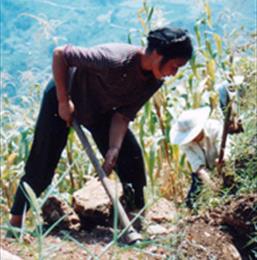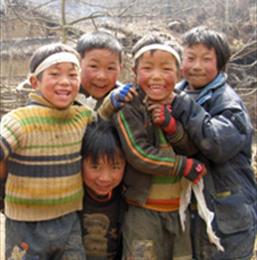Wansheng Village
Wansheng Village is situated in the south east of Hanyuan County, on a high plain amongst the steep gorges cut by tributaries of the Dadu River At 1,900m above sea level Wansheng Village lies on the snow line and every winter spends most of its time below zero degrees Celsius.
The village is divided for administrative purposes into eight hamlets (zu) although five of these are clustered together in a dip on the plain to form a small town. This town acts as the administrative centre for the surrounding area and goes under the name Huangmu - which can be translated as 'Emperor's Trees'. The area's trees were used for constructing the buildings within the Forbidden City in Beijing, formerly the seat of the Emperors of China - hence the name. There are no trees now, as the surrounding land has been turned over to agricultural production, mostly for potatoes and maize.
Although there are a number of ‘work units’ in the town and small shops, the majority of the households are farmers. The village houses are made of wood and mud brick with tiled roofs. In the town newer buildings are being built using concrete bricks. The main roads into the village are unsurfaced tracks although the very narrow 'shopping street' boasts a concrete surface and is lined with wooden open-fronted shops. Behind them are meandering pathways winding between farm houses.
All of the houses in the village are connected to an electricity supply. Electricity use is however minimal, with just a couple of bulbs per household being the norm.
The town is a sleepy little place with people often seen sat on small stools playing cards or simply having a chatting the day away. The only activity commonly seen is the washing of clothes at the 'well'. This peace is interrupted every three days as shops open their shutters, set up stalls on the streets and traders arrive in dilapidated buses and on foot with fresh vegetables and meat. This market is visited by inhabitants of the surrounding villages, many of which are in very remote locations.
About 100 years ago, the area was also host to a number of French missionaries, who left a legacy of Catholicism. About 20% or more of the local people are said to be practising Catholics, served by a travelling Pastor, Father Fu. With funds from Hong Kong sources, a large new church has been built in Huangmu Town with twin towers. There is also a newly built Buddhist temple in neighbouring Guangrong Village .
When DORS first visited Wansheng, the villagers in the area were drinking water from Huangmu irrigation channel, which is an open ditch running past the village hamlets. Most people have to travel some distance to fetch water from this channel although within the town there is an existing piping infrastructure that also takes its water from this channel. The water itself is often dirty due to pollution upstream from grazing animals, rainwater run-off, people washing clothes and children swimming in it.
DORS project in Wansheng involves supplying the 1600 people of the village with fresh drinking water from a mountain stream source. This source was already channelled for some distance to a point above nearby Guangrong Village (hamlets 2 and 3). The project now brings water from the source (about 4km away from the town) to Wansheng in plastic piping which is buried about a metre into the ground to avoid freezing during the winter. From storage tanks above each of the hamlets and a large tank to supply the town, pipes take the water to each household. The 400 people of Guangrong 2 and 3 hamlets also benefit from the new supply.
Thanks to funding from The British Partnership Scheme run by The British Embassy in China, DORS was able to begin this project in October 1997.
Project completed
Assisting Schoolchildren - DORS Education Project
As part of our integrated approach to tackling the problems in Hanyuan's villages, we provide short-term assistance to children from our project villages who do not have the opportunity to attend primary school because their families can not afford the mere 200 RMB primary school fees. We expect that through our other projects in a particular village, such as Drinking Water, long term improvements will be achieved, and in time, families will be in the position where they can afford to pay their children's school fees themselves. However due to the poverty that exists in many of the villages where we have projects many children are forced to drop out of school. DORS provides support to the poorest children in our project villages by paying their school fees.
DORS have been providing education assistance in Wansheng since September 1997. To read more about our our support of students please visit our Education Project page.
The Drinking Water Project in Wansheng was completed in November 1998.
Also, during our work on each project we carry out a detailed baseline study of each village, this can be see at: Wansheng Village Baseline Study.


